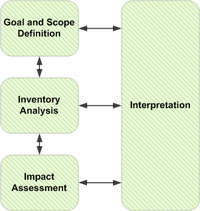
Photo from wikipedia
Abstract Due to advancements in product design and technology, products in the market today are capable of an extended life cycle by undergoing end-of-life treatments. To enable this, products have… Click to show full abstract
Abstract Due to advancements in product design and technology, products in the market today are capable of an extended life cycle by undergoing end-of-life treatments. To enable this, products have to be designed for multiple life cycle (MLC) purposes. Besides that, the presence of technology innovation has led to the generation of multiple products. Therefore, it is crucial to evaluate the life cycle of products in a wider scope. Currently, an existing method that approximately accommodates this objective is the Life Cycle Assessment (LCA). However, the current LCA guidelines and standards are still insufficient to assess the environmental impacts of MLC products due to the limitation of the conventional LCA procedure, which only focuses on a single life cycle. Therefore, it is highly important to extend the current concept of the LCA to a Multi-Life Cycle Assessment (MLCA). It is possible for an MLCA to quantify the environmental impacts of MLC products and to evaluate the flow of materials among the generated products. To date, only two studies have explicitly mentioned the term ‘MLCA’, but both had different perspectives and methodologies. Moreover, previous LCA studies focused on evaluating the environmental performance of MLC products, such as remanufactured and recycled products. Therefore, this paper was aimed at proposing MLCA perspectives for assessing the environmental impacts on the MLC product system. To achieve this aim, a comprehensive and systematic review of previous LCA and MLCA studies that dealt with MLC problems was conducted. From the review, the knowledge gaps in the field of study were identified so as to contribute to an understanding of how the LCA can be extended to the MLCA for environmental sustainability.
Journal Title: Journal of Cleaner Production
Year Published: 2017
Link to full text (if available)
Share on Social Media: Sign Up to like & get
recommendations!